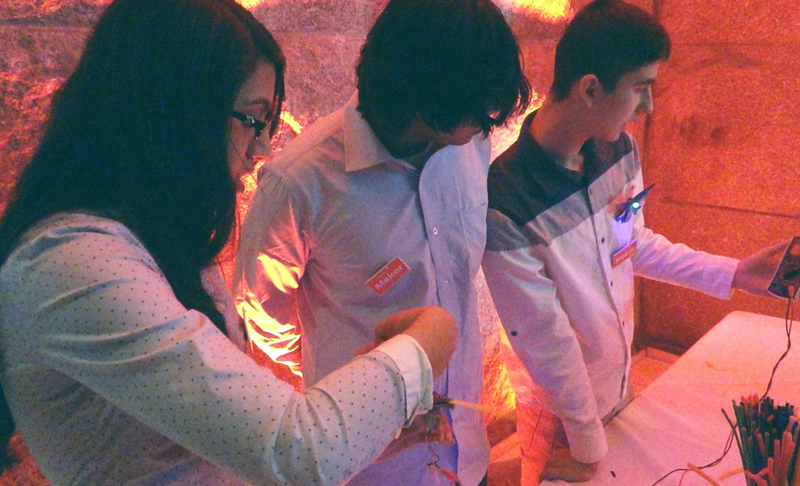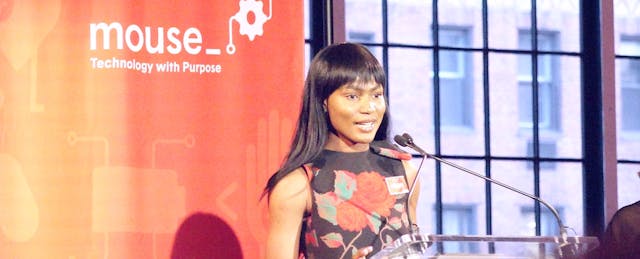“Everything that is old is new again!” Daniel Rabuzzi exclaims, his eyes light up with excitement that seems to match the glowing, handcrafted flower pinned on his vest. He’s talking about the next wave of the Maker Movement, big news buzzing amongst makers in the inner circle.
Rabuzzi is the executive director of Mouse, a national nonprofit that encourages students to create with technology. The organization, now celebrating 20 years in operation, is part of the worldwide Maker Movement, encouraging students to get creative (and messy) when using technology to build things. Rabuzzi calls his work at Mouse “shop and home economics for the 21st century,” and his students “digital blacksmiths.”

Rabuzzi, like many experts within the Maker Movement, believes the heavy emphasis on standardized testing in schools, which has pushed the arts, shop and home economics into the shadows, is what spurred outside groups like Mouse to begin hosting alternative makerspaces for students. Throughout the years, Rabuzzi has seen the movement evolve. Most recently, he’s seen technology become more directly integrated with making, along with an uptick of women in leadership.
“It can’t just be the boys tinkering in the basement anymore,” says Rabuzzi, pointing to women in maker leadership, like littleBits founder Ayah Bdeir, who encouraged more young girls to enter the space.
Now Rabuzzi, along with makers, investors, and journalists, are buzzing about what they describe as the next wave of making: the Maker economy, which many believe will transform manufacturing the United States by integrating with the Internet of Things (IOT), augmented reality (AR), virtual reality (VR) and artificial intelligence (AI).
“There is all this talk about bringing back manufacturing to America, and I feel like this is going to come back on a local level,” says Juan Garzon, former Mouse student, who started his hardware company. He believes that personalized goods designed and manufactured by Makers through mediums like 3D printing will drive the return of domestic manufacturing.
“The future of manufacturing is not a big plant, but someone designing what they want and developing custom made things. It sounds so sci-fi, but it is within my lifetime,” continues Garzon.
News reports from Chicago Inno show that custom manufacturing designed by makers might be an active part of the domestic economy sooner than Garzon realizes. Inno reports that several Maker-entrepreneur spaces are popping up in the city with hopes to develop places where creators can build scalable products to be manufactured, creating new businesses.

For many, talk of 3D printing and merging Making with AI are bleeding edge topics, far away from today’s realities. But for technologists supporting Mouse, this the world they want to prepare students to be a part of.
Mouse students at the 20th-anniversary party are already getting started. At the event, some students proudly showed off projects they designed in 3D spaces that can be viewed and altered in virtual reality. Many of the projects students worked on required a mixture of creativity, technical skills and awareness of the societal needs. Displays showcasing green energy projects along with digitalized wearable technology for persons with disabilities were all throughout the room. Still, Rabuzzi imagines more.
He hopes that through making, students can test the limits of new technologies and do good for the society. “How do we use Alexa and Siri in the Maker Movement?” Rabuzzi wonders aloud. He describes his idea of using AI to support students in designing, prototyping and creating new learning pathways in future, but admits that he doesn’t have the funding or technology for such ambitious projects now. He hopes that some of Mouse’s corporate funding partners are interested in supporting the endeavors.
“We are preparing today's young people for a cyber future,” he explains. “In the old days if you had a clever idea you had to go into a big company to get it done. Now you can make it yourself.”


